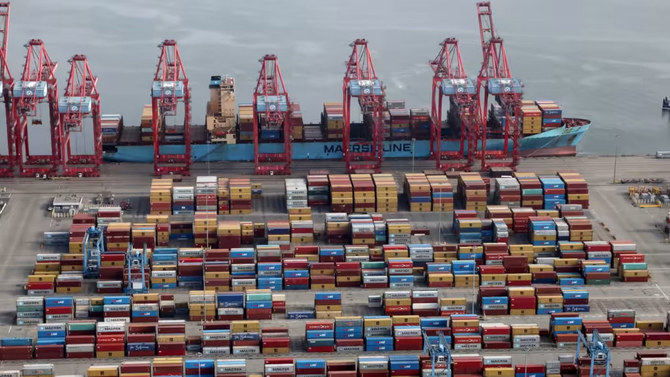Global supply chains once again under threat

https://arab.news/8grnq
The supply chain plays a crucial role in the global economy and sea lanes are the conduit through which a large part of goods and supplies including energy are transported.
We only need to think back to the coronavirus disease pandemic to see what disruption in supply chains meant. Even a task as simple as building schools in one part of the Gulf region proved difficult when steel from China or furniture from Turkiye did not arrive in time or at all.
This is why, the current situation in the Bab El-Mandeb combined with extremely low water levels in the Panama Canal do not just have shippers, but also manufacturers, retailers and importers of hydrocarbons worried.
Ever since the Houthi attacks on commercial vessels in the Bab El-Mandeb Strait, which divides Yemen from Djibouti and Eritrea, global shipping firms have been on tenterhooks.
The most recent attacks toward the end of last week and early this week prompted the world’s largest container shipping company AOP Moller Maersk and the fifth largest German-owned Hapag Lloyd, to stop sending vessels through the Bab El-Mandeb. BP and Equinor also halted shipping through the Suez Canal.
Thirty percent of all the container trade and 10 percent of global oil go through the Suez Canal. Any ship bound for the Suez Canal from the Indian Ocean needs to cross the Bab El-Mandeb. So, when the big boys stop sending their vessels, it is time for people depending on supply chains to worry.
The situation has prompted the US to put together a multinational initiative to bolster security along this key trade route. The coalition of 10 countries includes the UK and Canada, France and Bahrain.
It is not just container trade we should be worried about. Oil and liquefied natural gas from the Middle East bound for Europe also need to cross the Suez Canal and with it the strait. By now two oil tanker companies have inserted clauses allowing them to use the route around the Cape of Good Hope in Southern Africa, if necessary, in their charter documentation due to concerns about the security situation in the waters around Yemen.
Europe has to be particularly worried in terms of energy security. Although gas storage facilities in Europe are filled above 90 percent, a cold winter will deplete stock quickly. Europe now depends increasingly on LNG as it has weened itself off Russian pipeline gas.
Brent prices have increased by around 3 percent since Dec. 15. The move was tapered by extra supplies we have recently seen coming from the US, Brazil, and Guyana. Natural gas prices spiked 13 percent in Europe.
The Suez Canal Authority issuing a statement over the weekend that operations are open is neither here nor there, because as mentioned before without crossing the narrow waterway between Yemen and Djibouti/Eritrea there is no access to the canal.
The trip around Africa adds nine days to the journey to Europe, which is expensive in terms of fuel, delays, and also higher insurance premia for any vessel getting close to the Yemen choke point.
As if the situation in the Sea of Aden was not dramatic enough the Panama Canal has severe constraints due to historically low water levels. During the first week of December 2022, 238 ships crossed the Panama Canal. This year it was only 167 for the same time period and things are getting worse. Next month the Panamanian authority will allow only 18 ships through the canal on any given day.
The Panama Canal is vital for trade between Asia / China and the East Coast of the US. Owing to the low water levels, some shippers are rerouting cargoes through the Suez Canal adding five days to the journey. If they now need to reroute the vessels further around Africa, that will add an additional six days until they reach the Eastern seashore, increasing the freight cost considerably.
We only have to look at the statistics, to see how dependent the global economy is on those two waterways: Twelve percent of all trade passes the Suez Canal and 5 percent crosses through the Panama Canal.
Global supply chains are affected by the geopolitics affecting the Gulf of Aden and the climate-induced constraints at the Panama Canal. This adds question marks on the reliability of supply chains. We can all remember the havoc the Taiwanese-owned vessel Ever Given reeked with manufacturers and retailers when she ran aground in the Suez Canal in 2021 blocking the waterway for six days.
What is happening now will add costs to supply chains resulting in additional inflationary pressures (core and CPI). That will also affect Gulf Cooperation Council countries where several huge projects are underway and rely on functioning supply chains.
The current situation has once again ignited the debate on restoring and friendshoring supply chains.
We live in an interconnected, globalized world which is why we need to watch with eagles’ eyes what happens in our shipping routes. Recent events prove that we cannot take their access and functioning for granted.
• Cornelia Meyer is a Ph.D.level macroeconomist, energy expert and CEO of Meyer Resources, a business consultancy.









































